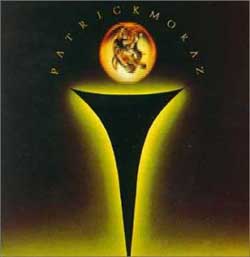Musings
an Online Journal of Sorts
By Alyce Wilson
February 2 , 2004 - Days of Future Passed

This weekend, The Gryphon and I primarily hung out at my place. I did some work on the Winter issue of Wild Violet, and we listened to a number of my vinyl records, thanks to my dad's thoughtful Christmas gift: a record player. We also watched some videos.
One album and one movie stood out to me for having a somewhat similar theme: the future, as viewed through the perspective of our past (the 1970s).
The first is a Patrick Moraz album, commonly referred to as "i" or "The Story of I," because the title is an unpronounceable symbol.
This particular album, recorded in 1976, is a concept album about a futuristic building, a "hotel" which offers to "people of all creeds, colours and sexes the realisation of their impossible dreams." The "i" stands for "initiation, identity, idealism, integration, illumination, immortality, infinity."
In this huge building, visitors proceed upwards, floor by floor, meeting different challenges over the course of their lives, sometimes falling in love. You meet these different people and view these different floors musically as the album progresses.
The music is spacy with some world music flavor to it. Patrick Moraz is regarded by many to have been the greatest keyboard Yes ever had, and the album captures that classic ethereal quality.
Moraz' vision of the future is a somewhat qualified utopia, since those who enter the building will not leave it alive. And yet, the endless possibilities of the different floors of the building, and the fact that visitors may proceed through it at their own pace, taking years, is both a metaphor for life and a vision of a hopeful future.
 We
also viewed an anime movie, Galaxy Express,
created by Leiji Matsumoto in 1979. This was one of The Gryphon's movies,
which he brought over because I'd expressed an interest. He'd been telling
me about the pirate character Captain Harlock and the many movies and
TV series based around him.
We
also viewed an anime movie, Galaxy Express,
created by Leiji Matsumoto in 1979. This was one of The Gryphon's movies,
which he brought over because I'd expressed an interest. He'd been telling
me about the pirate character Captain Harlock and the many movies and
TV series based around him.
I'd developed an interest in pirates this summer, after seeing Pirates of the Caribbean.
Rather than following Captain Harlock, though, Galaxy Express follows Tetsuro Hoshino, a human boy whose mother was killed by a heartless nobleman, Count Mecha.
Although he was once human, Count Mecha now has a mechanized body and despises flesh and blood humans, regarding them as prey to kill on hunting expeditions.
Tetsuro learns of a world which gives out free mechanized bodies to anyone who wants one, only accessible by taking the Galaxy Express 999, which is a spacecraft which resembles a train. His plan, once he receives his mechanized body, is to come back and kill Count Mecha.
He befriends a mysterious woman, Maetel, who agrees to get him a ticket and to accompany him on the journey.
This story, despite its futuristic character, has a very mythical quality to it. The revenge quest, and the fact that Tetsuro encounters people along the way who give him the objects or knowledge he needs to achieve his goal.
I was captivated with both the artwork and the storytelling of Galaxy Express, which has a fair number of plot twists, none of which I anticipated.
The future of Galaxy Express could be termed a dystopian future, where high technology has superseded humanity.
Patrick Moraz and Leiji Matsumoto, creating these works in the 1970s, came up with distinctly different visions. Moraz, it seems, was still hoping for a Flower Child's vision of the future: a huge commune-like society of hope and possibility.
Matsumoto, on the other hand, saw a future that was enamored with technological advances and envisioned what would happen with the eventual split between the rich who could afford such technological wonders and the poor who could not.
Neither one of these visions is set in the near future but in an indeterminate future. Even so, the future of today seems closer to Matsumoto's vision than to that envisioned by Moraz. And yet, there is a ray of hope. Even in Galaxy Express, there is redemption for those with integrity and honor, who are willing to fight against a corrupt society. These outsiders, these outlaws, are tomorrow's hope.
In one way, both visions of the future are similar, in that the way towards happiness is through connection and cooperation with others. That will continue to remain true, regardless of what happens in our future.
Moral:
Visions may change, but truth remains.
Copyright
2004 by Alyce Wilson
What
do you think? Share your thoughts
at Alyce's message board (left button):
![]()
![]()

